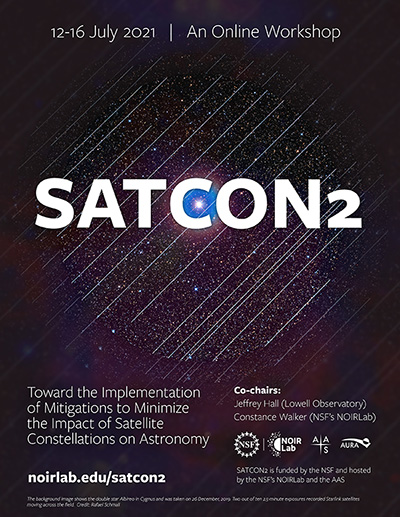Satellite Constellations 2 Workshop Announced

Richard Fienberg AAS Solar Eclipse Task Force

The Satellite Constellations 2 (SATCON2) workshop will be held virtually 12-16 July 2021 to discuss how to implement the mitigation strategies (determined in SATCON1) to minimize the impact of satellite constellations on astronomy.
SATCON2, the successor workshop to last year's SATCON1, has three objectives:
- Define and quantify resources, metrics, and collaborations needed to implement the SATCON1 recommendations, many of which will require substantial effort and funds to address.
- Engage astronomers and satellite operators collaboratively in exploring policy frameworks and developing policy points for operations in low Earth orbit (LEO).
- Increase the diversity of stakeholders and perspectives working to address both the challenges and the opportunities for astronomers, satellite operators, and all of humanity created by the industrialization of space.
From May through early July 2021, four working groups will explore topics relevant to these goals:
- The Observations Group (chaired by Meredith Rawls, University of Washington & Vera C. Rubin Observatory) will develop a plan for the implementation of Recommendations 8-10 in the SATCON1 report. The plan will define (1) optimal strategies for observations of LEO satellites, (2) the structure and resources required of an observing network of professional and amateur astronomers, and (3) the requirements for publicly accessible satellite positional information.
- The Algorithms Group (co-chaired by Jonathan McDowell, Center for Astrophysics, and Robert Seaman, University of Arizona) will develop a plan for the implementation of Recommendations 1–3 in the SATCON1 report (though the group may examine any of the SATCON1 recommendations at its discretion). The plan will define the resources and timescale for developing the recommended applications.
- The Community Engagement Group (co-chaired by Aparna Venkatesan, University of California, San Francisco, and James Lowenthal, Smith College) will engage a wide set of stakeholders in discussion of how space is used as a natural and cultural resource for multiple purposes. The group will identify key issues impacting these stakeholders and will define the parameters and requirements of an “E-Institute” that would allow ongoing communication and collaboration in a virtual environment.
- The Policy Group (chaired by Richard Green, Steward Observatory, University of Arizona) will review existing national policies and legislative frameworks. With the SATCON1 recommendations as context, the group will assess policy options to serve the diverse requirements of astronomy, the satellite industry, and other communities.
The working groups will present draft proposals for discussion at SATCON2, and the final results will be summarized in a written report after the workshop.
We welcome expressions of interest from individuals wishing to join one of our working groups. Please indicate your interest by submitting an application before 17 May 2021. Depending on the response, working-group chairs may not be able to accommodate all expressions of interest.
Apply to Join a SATCON2 Working Group
Registration to attend SATCON2 and discuss the working groups’ draft proposals is free and will open in June. We welcome anyone working in the astronomical sciences, the satellite industry, the federal government, and related fields or organizations. In order to encourage frank and open discussion among all stakeholders, we are not inviting members of the news media to the workshop but will hold a virtual press briefing upon its completion on 16 July. Details will appear in a future media advisory.
SATCON2 is funded by the National Science Foundation (NSF) and is hosted by NSF's NOIRLab and the AAS. Jeffrey Hall (Lowell Observatory) and Constance Walker (NSF’s NOIRLab) are the workshop’s co-chairs.

